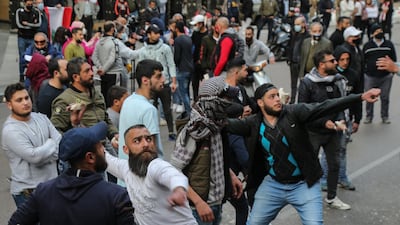On March 3, Lebanon’s caretaker Public Works and Transport minister, Michel Najjar, announced a 30 per cent hike in travel fares to support taxi and bus drivers.
Rising fuel prices combined with weeks of a stringent lockdown caused their revenue to plummet.
The cost of shared private taxis, widely used in the absence of an efficient public transport system, rose temporarily from 3,000 Lebanese pounds ($2) to 4,000 Lebanese pounds until the end of confinement measures scheduled for March 22. This increase followed a 50 per cent hike last summer, the first in over a decade.
The successive price increases represent a significant burden for impoverished Lebanese commuters, but most agree to pay it. “It’s a fair price. The Lebanese pound is dead,” said Fadi, an elderly man waiting for a shared taxi in Beirut earlier this week.
The local currency has lost more than 80 per cent of its value since 2019 as the country sinks deeper into economic crisis. More than half the population has been pushed into poverty.
As Fadi stood under a bridge on a busy roundabout near Beirut’s Justice Palace, several taxis stopped to offer their services. One asked for £5,000 instead of £4,000, arguing that his destination was far away and passengers few.
Fadi refused. Sitting nearby, a young man nodded approval. “Drivers who want £5,000 are crooks,” he said.
Demanding a higher price than that decided by the ministry is technically illegal. But drivers asking for £5,000, a 66 per cent rise, say they are following the decision of one of the country’s taxi unions.
Here lies the problem. Four confederations represent the country’s 37,808 registered taxi drivers. One is excluded from the decision-making process because of a long-standing feud. As a result, its decisions are different than those agreed between the Ministry of Public Works and other unions.
The recent price rise was announced in a joint press release with Bassam Tleiss, who told The National he represents the confederations and unions of land transport. This group of three transport unions was set up two years ago so they could "express themselves in one voice" to the government.
It includes his union, the Lebanese confederation of unions of drivers of public cars and transport administration; the federation of unions of public drivers in Lebanon, which was headed by its veteran communist president, Abdel Amir Najdi, until his death two months ago; and the loyalty union of transport, led by Ahmad Al Moussawi, who is affiliated to Hezbollah.
Mr Tleiss said the latest price hike would probably remain in place despite initial claims it would end when the lockdown was lifted.
“Because of the economic crisis and people’s living conditions, it will maybe stay,” he said. He was speaking in his office inside the headquarters of the Amal movement, a Shiite political party and Hezbollah ally.
Marwan Fayad, who leads the country’s fourth taxi confederation, is not part of Mr Tleiss’s group.
The two men fell out 14 years ago for reasons that remain vague. Each claims to represent more drivers than the other. The Ministry of Labour and the General Confederation of Lebanese Workers were unable to provide precise numbers.
From his office in Dawra, a busy transport hub on the outskirts of Beirut, Mr Fayad, 64, implied he had been pushed aside in part because he was the only taxi union leader who is Christian.
He is rumoured to be close to the Lebanese Forces, a Christian political party that has rejected participation in government.
Mr Tleiss, 60, rejected what he called “sectarian language” – which is not uncommon in a country in which power is shared along faith lines.
Mr Fayad said £4,000 per ride was not enough to compensate for drivers’ losses. Asked whether drivers seeking £5,000 break the law, he said only that clients “do not complain” and pay “easily”.
He accused the government of distributing only half of a promised financial aid package, of £400,000 per month, to taxi drivers during lockdown and of turning a blind eye to the tens of thousands of illegal taxis, which have operated freely for decades.
Mr Tleiss said he suggested the financial aid package to caretaker Prime Minister Hassan Diab last March and that its launch had been relatively smooth.
The Lebanese army has distributed £400,000 a month to 35,000 of the 42,000 intended recipients, who include minivan and taxi drivers. Delays have been caused by difficulties in locating drivers, he said.
But on the ground, discontent is rising.
Massive protests erupted late in 2019 and lasted several months before dying down. They picked up again on a smaller scale on March 2, when the local currency hit a symbolic historic low, £10,000 to the dollar.
“I make £200,000 a day. That’s $20. What can I do with that?” complained one taxi driver, who asks for £5,000 a ride.
The soaring inflation is on everyone’s minds. Government statistics from last December show the price of food nearly quadrupled in one year. Additionally, car owners must pay for imported spare parts at the black-market rate.
Trade unions can do little to stifle such discontent. They are co-opted by political parties and their decision-making is not independent, said Lea Bou Khater, a development expert and a specialist in labour relations.
If taxi rates do not keep up with the soaring inflation, “drivers could rebel”, she said.
Transport systems expert Tammam Nakkash said Lebanon’s public transport system would remain chaotic without significant reform. The World Bank-funded Greater Beirut Public Transport Project was approved in 2019 but has not made significant progress.
“This is the real problem. Lebanon is a dysfunctional state. Nothing is running right,” he said. “We are talking about public transport, but it is but one aspect of the general failure of the country.”


